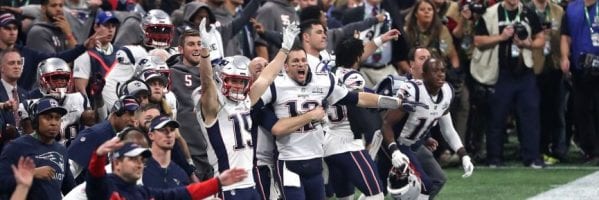Kellogg MBA Students Choose Best 2019 Super Bowl Ads

Aside from Tom Brady, Aaron Donald, and a shirtless Adam Levine, there’s no doubt that the Super Bowl commercials were the star of the night last Sunday.
The game, certainly, wasn’t the most thrilling. So the question is, what was the best ad of the 2019 Super Bowl? To get to the bottom of the question, a panel of Northwestern Kellogg MBA students got together to discuss each commercial. In the end, they looked for the ads that were the most and least effective at driving business and building their brands.
How Super Bowl Commercials Evaluation Works
First, before we dive into the best and worst ads, it’s important to know how the Kellogg MBAs made their evaluation. Working alongside two of the school’s most widely respected marketing professors—Time Calkins and Derek Rucker—the MBA panel applied the strategic ADPLAN framework.
A—Attention: Did the commercial engage the audience?
D—Distinction: Was the execution unique in delivery?
P—Positioning: Did the commercial represent the appropriate category and feature a strong benefit?
L—Linkage: Will the benefit and brand be remembered?
A—Amplification: Were viewers’ thoughts favorable?
N—Net Equity: Was the commercial consistent with the brand’s reputation and history?
From here, the MBA students came up with the final 2019 rankings.
Microsoft Super Bowl Commercial Wins
For the most effective ad, Microsoft took home the top prize. Their commercial spot was not only charming, but it stood out for its emotional tone and lack of clutter. The ad demonstrated Microsoft’s new adaptive controller and how it helps disabled kids play video games and form friendships. A clear benefit was apparent, showing how Microsoft technology makes the world a better place.
Amazon, Expensify, and Other Standouts
Other stand out advertisers for the Super Bowl included Amazon, Expensify, Washington Post, Pepsi, Bumble, and Google.
Bizarre Andy Warhol Burger King Commercial Flops
As for the least effective Super Bowl commercial, that honor went to Burger King. Their strange ad featured 1982 footage of Andy Warhol eating a Whopper, but it just came across as dull and uninteresting. Other advertising failures included the confusing Avocados From Mexico ad, Sprint’s flying horse disaster, the Turkish Airlines dark and scary spot, Mint Mobile’s unappealing chunky milk, and Simplesafe’s unbalanced ad. As for why each of these commercials failed, it always came back to a confusing message that didn’t deliver a clear benefit.
This article has been republished and edited from its original source, Clear Admit.
Booth Research Reveals Dominance of Snap Judgement, and More – Chicago News

Let’s explore some of the most interesting stories that have emerged from Chicago business schools this week amidst the Polar Vortex (stay warm, everyone).
Why People Make up Their Minds Sooner Than They Realize – Chicago Booth News
More information does not necessarily lead to more informed decisions. New research from the University of Chicago Booth School of Business finds that people assume they can and will use more information in making decisions, despite the contrary evidence. Often, people make snap judgement without awareness and most collected information goes unused.
Ed O’Brien, Chicago Booth Associate Professor and co-author of “People Use Less Information Than They Think to Make Up Their Minds,” asserts, “In our studies, participants thought they would withhold judgment and await a lot of evidence before making up their minds but in reality, they cast judgment right when the evidence came in.”
Researchers note that the data suggests a gap between information seekers and information providers.
“For example, people who go online to research a topic or take part in a debate may only access a small fraction of what is available before making a decision while providers of that information may assume the seekers are taking in all the information and hear them ‘loud and clear.'”
You can read more about Ed O’Brien’s research here.
Why We Can’t All Get Away with Wearing Designer Clothes – Kellogg Insight
While luxury brands are a surefire way to indicate status, a new series of experiments reveal the surprising downsides of luxury consumption.
According to a new paper by Northwestern University Kellogg School of Management Professor of Marketing Derek Rucker and Ph.D. candidate Christopher Cannon, luxury consumers may find themselves at a disadvantage in the hiring process. This instance is even more particular when the job involves interpersonal warmth. Rucker and Cannon’s research explores how consumers who wear luxury goods are viewed more negatively and perceived as “cold.”
Cannon notes, “We don’t find evidence in this work that the effects are driven by envy. We find evidence that luxury consumption can lead people to infer certain motives. Specifically, when people assume that someone has donned luxury goods in order to show off, this can lead them to see that person as less warm.”

Despite the obvious social appeal, Cannon and Rucker’s new research suggests that luxury brands, like Gucci, tend to create an impression that appears interpersonal.
Cannon and Rucker point out the importance of evaluating the situation before donning your Gucci. “We’ve shown situations exist where luxury consumption produces positive outcomes, such as when filling the corporate publicist role in the experiment. Rather than luxury always being good or always being bad, it depends on whether status or warmth is more important.”
You can read more about the luxury research here.
Howe Teaches Students How to be Professional Leaders – Gies School of Business News
Alan Howe (BADM ’82), a professional board director, has served across multiple industries—including enterprise software, wireless, telecom, composite materials, and IT services—specializing in “turnaround” situations. He recently returned to the University of Illinois Gies College of Business to share his expertise with the next generation of business leaders.
“I tell students that what they think they’re going to be doing in the next three years is probably radically different than what they’ll be doing in 10 to 15 years, so get ready for change. Be adaptable because you never know where the next opportunity may come from,” Howe asserts in a recent profile.
In the interview, Howe further explains what makes a great business leader:
“The best characteristic is humility. You can’t ‘big dog’ in a corporate setting or talk about how smart you are. Lead with humility. Also listen and learn from people around you.”
You can read more from the Howe interview here.
